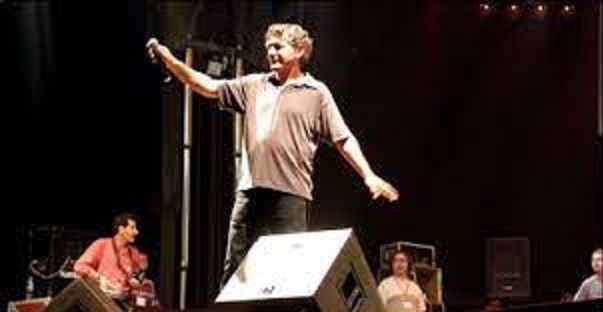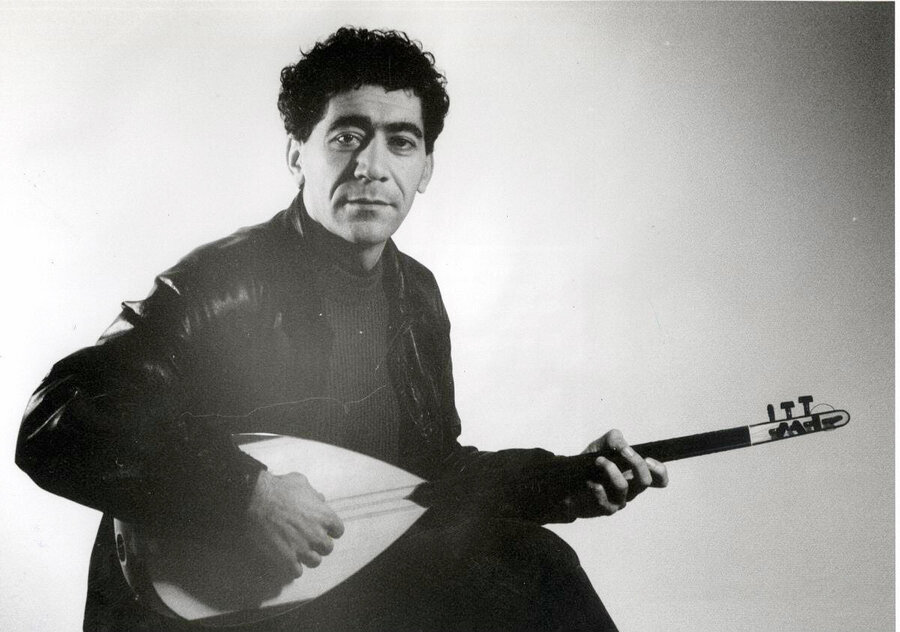I saw Jwan Hajo's picture on an album called "Douri" (Being Far Away) in Izmir, Turkey for the first time in 1994. He seemed really sad. He was staring with sad eyes. I used to listen to heavy metal music at that time. Metal music was very popular back then, but due to Nirvana Court Jobain, the Grunge music (a kind of Rock music) was also available. I had never heard Jwan Hajo's music before, but a year after I entered college I got interested in my music, Kurdish Rock, to listen to it. I asked everyone especially my brother (who was a political activist) if there was such a thing as Kurdish Rock music or not. Everybody answered the same thing.
You need to listen to Jwan Hajo.
I found these two albums of his which were published in Turkey: Douri (Being Far Away) and Si w Se Gullah (Thirty-three Bullets). I listened to Jwan Hajo's music with Walkman all the time. After a while, I looked for other albums of his, but they were all banned in Turkey. I could find "Dilakani Azadi" (Liberation prisoners). Some of his songs including "Ay Dilbar" (Hey lover), "Gharibi" (Being a stranger), and especially "Dilakani Azadi" took me to another world. "Niheni Sibayne" (Tomorrow's Secrets) captures my ear like a magical voice. I got sick for a while and I could not eat. I only was listening to the "Dilakani Azadi" album and when one side of the cassette would end, I only would stand up to change it. If I remember correctly, I listened to this album for two days straight.
We could finally find several different albums of Jwan Hajo without knowing their titles or when they were recorded. The most terrible thing was that those albums of Jwan Hajo that we were listening to were a copy of another copy so Jwan's voice sounded very weak, although we did not care anyway. He was a magical man for us. We needed him. We needed a Kurdish rock star. The song "Hey girl come here" was sung in Hard Rock style. We loved to listen to it, shake our heads at it, and go crazy about it.
Later, his albums were published in his original voice and we understood more and more that Jwan Hajo's real voice is so strong and beautiful. It was no longer the tenth copy of his works but the original version.
My friends and I would listen to them and we made jokes. Some of them would say; "I dream of Jwan Hajo every night and sometimes I am his guitar or drums player…" What did we see in his name that made us so crazy about him? When I look back at those days, I realize that he became a reason for us to get rid of those days' situation and create a modern Kurdish life for ourselves. It seemed like we were living in a free country living with our own language and thoughts.
I believe the "Thirty-three Bullets" album was a turning point in the history of Rock music in the Middle East, Kurdistan, and Turkey. "Dialogue" song was a description of our angry souls making our faith stronger. "A Flower" song was both a love song and a political one. The song "I Can't" was clearly expressing his philosophy. This was a song about being poor and happy for us. Later, he published an album that only had one song. "The Story of a Hero" makes us so excited with its original song and Mohammad Ozun's poem. Before this album, the album and songs "My Flute" and "Zine" made us so enthusiastic with their music and lyrics. His old albums were continually published. When they were published, we found out that we had not listened to some of his albums or some songs that we thought were Jwan Hajo's, in fact, were not his works. We found out that we had listened to Abbas Ahmad instead of Jwan Hajo who sounds very like Jwan with his music style and his voice. For example, "The Beautiful Girl" album belonged to Abbas Ahmad. It was not an original work; it was a copy of another copy of his work that made it difficult to realize whether it was Jwan Hajo or someone else.
"The Red Flower" was a special album. We can call this album a folklore-rock work. The songs of this album, "My in-love Friend", "The Mine", "The red flower", and "Yerevan" were very popular among people. "Amina Amina" sounded like classic Kurdish music. The recording was not very professional but Jwan's epic voice was clear anyway. We can say that his albums in the 1980s contained political songs. In those years, Kurds' and Kurdistan's situation everywhere was very bad. In the North part of Kurdistan, armed battles had begun, in the South part of Kurdistan, Saddam Hussein was committing Anfal and genocide of Halabja. Jwan's brother who was fighting in the North part of Kurdistan's battles had died. These events affected Jwan's songs and lyrics. "I don't want a handmaid in Diyarbakir Tower" was a brief summary of the Kurdish revolution's history.
We were waiting for Jwan Hajo to come to Kurdistan and have a concert as he was participating in the Kurdish channels' programs. In 2003, it was said that he would come to Batman's festival. Who can wait for this? The only thing that was talked about in those days was Jwan Hajo's concert. We were talking about the concert for days and planning how to go there. Some went to Batman with their own cars, and some went a few days earlier and stayed in their relatives' homes. We also rented 15 to 20 minibusses for the Tigris college students and went to Batman. It took three hours to get there. It was supposed to take one hour to get there but since the roads were very crowded, it took us three hours instead. There were a lot of people who were crying in the concert area and some were kissing Jwan Hajo's pictures and photos. We listened and watched the concert as if Jwan Hajo and we were enchanted. It was like a sweet dream. A company had organized several other concerts, but the music players changed every time; the audience, however, wanted to see that group of music players who had accompanied him in the Being Far Away album. Jwan Hajo had a photo with them. Those concert' photos were not very well taken. This was my first and last concert of Jwan Hajo because apart from this one, none of his concerts were organized so enthusiastically and Jwan Hajo never seemed the same as the Jwan Hajo that we used to know.

Jwan Hajo - Batman Concert
We were always looking for his new albums. "Darya" was published. He had a different voice. It was electronic. The electronic effects had been multiplied. We knew that Jwan Hajo was always trying a new thing. We did not care and once again we felt amazed by his "Qamishlou", "Faqiro" and "I like" songs. Jwan Hajo became more popular among the Turks in Turkey. He was listened to as a Kurdish musician. He was a unique and original artist for us until he published "No No", "Oh!" and "Come Back" albums. However, we do not know how he participated in sound pop music and TV channels and said that he wanted to present his music in discos and clubs after these albums. His music had changed into something different. We were all wondering and wishing for Jwan Hajo's previous albums and old works. Some said his director had misled him, and some said the Kurdish bourgeoisie had tricked him into being a part of Turkey's music industry. But it is obvious that he came to Turkey and had a concert because he missed his homeland. In one of the Scandinavian channels, he said that he did not want to step on the large stage of concert halls but he also said he would do so for his people.
I did not like the albums he published after "Darya", however, some of his songs in the "Oh!" album had the same Jwan Hajo's taste as the old albums. A few people know these songs because songs like "Oh!" and "No No" became popular and the old fans stopped listening to his songs. "Your Forest", "Vinda bu", and "The words get cold" in the "Oh!" album were high quality and valuable songs. I believe that if these songs were recorded with a different voice or a different video, they would be much more popular.
Whatever the reason is, it is not important to me. Anyone who has listened to Jwan Hajo from the beginning will know that every album of his is different from his next album because of his voice. He does not stop in a spot and continues to attempt more. Jwan Hajo became who he is because of his own life and perspective. During the 1990s and 2000, he recorded his footsteps in music. We all wait for that day that he said in his concert:
_ Are we brothers and sisters?
And everyone cried out: Yes!
_ So give me a beer!









